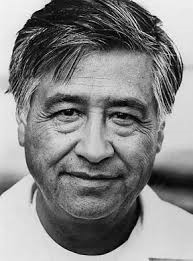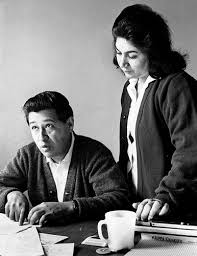Cesar Chavez
by Zach from Round Rock

|
| Ceasr Chavez (www.csusm.edu ()) |
Si, Se Puede:
Cesar Chavez, is a Mexican American who was born in Yuma, Arizona on March 31,1927 to Librado and Juana Chavez. His family owned a farm and country store but as the Great Depression and drought intensified it forced his family to move away off the land. Cesar Chavez was taught by his parents to value hard work, see the inequalities of the farm labor system and care for those who are less fortunate than others. He began to fight for farm laborers' rights when the Delano grape growers cut the pay rate in half during the harvest season. From there Cesar Chavez became the leader of the AWOC, the Agricultural Workers Organizing Committee. His slogan stated "Si, Se Puede" which is translated "Yes, You Can", he proves that anything is possible.

|
| Helen Chavez (www.latinpost.com ()) |
Growing Up In California:
When Cesar Chavez was a boy he attended in English speaking schools. This made it very difficult for Cesar Chavez since he did not understand English and teachers could not understand Spanish. He eventually learned to read English from school and Spanish from his family. After his family had lost the farm they moved to California where they looked to work in the fields. The work was not consistent in one area so the Chavez family had to travel from farm to farm in search for work. Working on farms were very difficult for Cesar, they had to work long hours and with little bathroom and water breaks. When Cesar was a teenager he volunteered for two years in the Navy. After his two years he returned home and married his high school sweetheart, Helen.
Shortly after their marriage they moved into California and started a family. Cesar's life really began to change after he met a man named Fred Ross. Fred Ross was part of the Community Service Organization. He believed that if people work together they can improve their community. Cesar was hired by Ross to work for him in the organization. Cesar helped many people in California to gain respect the person deserved, to help them learn the privileges the people have like voting. After helping others with respect in the communities Cesar left the organization to pursue his dream of helping farm workers gain respect and rights. Cesar did not believe in violence, he used peaceful protesting which encouraged others to join the boycotts. Like Cesar the people believed in nonviolence, better treatment, respect, dignity, justice, and fairness. After five year of protesting and boycotts, many growers agreed with Cesar and provided better working conditions for their workers. Cesar had won making farm worker's lives better; they are now treated with respect and dignity. Cesar Chavez did not stop fighting for the rights of farm workers, he continued to work for fair treatment all around the United States. Cesar E. Chavez died on April 23, 1993, he was 66 years old. Cesar Chavez will always be remembered around the world as the man who fought to improve the lives of all people.
Why Cesar Chavez is my Hero:
My favorite well respected hero is Cesar Chavez because he defended the rights and pay of the Latino laborers that worked on the grape farms in California. He did not think about himself; he thought of others and what they were going through. Cesar Chavez experienced the labor system himself. He knew what others were going through. He did not only just defend the laborers in the fields but others who were facing unfair rights like school education. Cesar Chavez proves to be a labor rights leader using non-violence protesting, fasting for a peaceful cause, and praying for equal rights. My dad personally used to work in the fields to help out the family with bills. He was about 12 or 13 years old when he started to work in Plainview, Texas, about an hour away from Amarillo. My dad told me Texas fields respected the laborers in the fields and had better working conditions. In California conditions were worse and workers did not have equal rights. Conditions in the fields were not very sanitary and farmers did not lower the amount of pesticides used on the crops. People working in the fields were exposed to a great quantity of chemical pesticides. Cesar Chavez led many strikes and boycotts that successfully brought grape sales down and allowed him to make a deal with growers for better pay and working conditions.PBS. "Cesar Chavez." PBS. PBS, n.d. Web. 21 Aug. 2014. . "Cesar Chavez." History.com. Ed. Eric Foner and John A. Garraty. A&E Television Networks, n.d. Web. 21 Aug. 2014. . "An American Hero The Biography of Cesar E. Chavez." Biography of Cesar E. Chavez (CA Dept of Education). Gov, n.d. Web. 26 Aug. 2014. . "Cesar E. Chavez,." Honoring Cesar E. Chavez. California State University San Marcos, n.d. Web. 27 Sept. 2014. .
Page created on 12/21/2014 12:00:00 AM
Last edited 12/21/2014 12:00:00 AM
The beliefs, viewpoints and opinions expressed in this hero submission on the website are those of the author and do not necessarily reflect the beliefs, viewpoints and opinions of The MY HERO Project and its staff.



